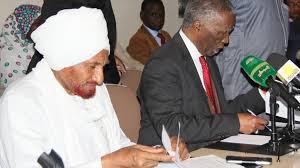
February 25, 2014
To: the African Union High Level Implementation Panel for Sudan and South Sudan
Re: The Draft Framework Agreement
Attention H.E. Thabo Mbeki, Chairman of the Panel,
- We appreciate your tireless effort to help the peoples of Sudan to help themselves. However, we have expressed some criticism of the Peace Processes in our country, and the Agreements which they have reached. The most important points of criticism are:
- The processes, and the ultimate Agreements reached through them were bilateral between the armed combatants. Negotiations between the combatants are necessary for ceasefire arrangements, and the safe conduct of Humanitarian relief. They are not sufficient for Peace building.
- National Political and civil society organizations, who are legitimate stakeholders have consistently been left out.
- Therefore, the peace accords lacked National guarantees, and National owning.
- We do not doubt the good will of our African brothers, and of the International Community, but they have focused upon stopping the war, to the relative neglect of building peace and Democratic transformation.
- All the documents concerned stress the importance of National involvement, for example, Security Council Resolution 2046 in article 3 states that the parties to the conflict between GOS and SPLM/N are expected to reach agreement on Framework Agreement of 28th June 2011. In that framework agreement article 3.f states: “Negotiations shall be undertaken in the context of broader dialogue and political processes at the National level recognizing the importance of cooperation between the parties for stability, development, democracy and constitutional reform in Sudan”.
- The case for a comprehensive holistic approach to the Resolution of our problems in Sudan is now stronger than ever. Thus:
- Sudanese Political opinion as led by the Umma National Party has swayed heavily towards a CODESA type National settlement for Sudan to prompt more dangerous possibilities.
- Although the Arusha consultations with the Darfurian groups was bilateral, the Arusha Statement quoted the position of the Movements: ”In support of peace and continuing engagement in the search for a political settlement in Darfur in the context of a holistic solution to Sudan’s problems”.
- The statement issued by E. U. in Brussels on July 2012 stresses the need for a comprehensive and holistic approach to the solution of Peace and Governance in Sudan.
- The two American statesmen of the US Institute for Peace, Mr. P. N Lyman, and Mr. J. Temin argued strongly for a pathway to National dialogues in Sudan.
- On the 27th of January 2014, President AL Bashir launched an initiative for a process of National dialogue without exceptions and with no ceilings.
- Therefore, it is necessary to recognize the emergence of a new political climate, which makes the bipartisan approach to the Peace Process in Sudan out of Date. The bilateral negotiators will be looking over their shoulders for the opinion of absent partners. In our current discussions with the NCP, we have suggested the establishment of a National Peace Council to represent the Sudan in the peace process. If the SRF accepts your draft proposal, eschew violence, and commit themselves to the resolution of conflicts solely by peaceful means within the territorial integrity of the Republic of Sudan, and if the other members of the SRF accept the same, the GOS, the AUHIP, and all concerned should recognize the front as a legitimate partner in the search for a comprehensive and Just peace, and democratic transformation.
- We sincerely suggest that it is time to abandon the bilateral talks between the NCP and the SPLM-N and prepare for the next round of talks between the representatives of the proposed National Peace Council and the representative of the SRF.
On behalf of the Umma National Party
I am Yours sincerely
Al Sadig Al Mahdi
- Prof Ibrahim Gandour
- Sayed Yasir Arman

